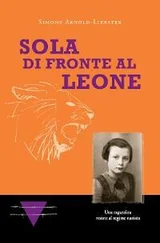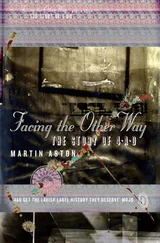FACING
THE
LION
Memoirs of a Young Girl in Nazi Europe
Simone Arnold Liebster

Facing the Lion: Memoirs of a Young Girl in Nazi Europe
Copyright © Grammaton Press, U.S.A.
Distribution for Europe:
Editions Schortgen • BP 367 • L-4004 Esch-sur-Alzette • Luxembourg
Tel.: +352 54 64 87 • editions@schortgen.lu www.editions-schortgen.luE-Book-Erstellung: Satzweiss.com Print Web Software GmbH
ISBN: 978-2-87953-139-7
DEDICATION
I dedicate this book to my beloved father who surrounded us with so much loving attention and beauty, and who provided gentle authority, exemplary courage, and a sense of humor, making our home a haven of peace.
I dedicate it to my cherished Mum who led her “little one” and helped her to grow into a happy adult, comforting her and surrounding her with motherly love and patience.
And also to Adolphe Koehl, Dad’s intimate friend, who so generously helped us to face our situation and whose exceptional courage and practical wisdom has enlightened my path.
And to my devoted aunt Eugenie who sacrificed all of her earnings and risked her life for us. She endeared herself to me like a second mother.
I shall not forget to dedicate this book to Marcel Sutter, whose life became an example for me and sustained me. He was a brother to me, a close friend.
I must include Charles Eicher, who encouraged me to go to New York. He put me in contact with my “Liebster,” and got me started in a new full and fruitful life.
HISTORICAL NOTE (von Abraham J. Peck)
HISTORICAL NOTE
During the period of National Socialism, the religious beliefs, teachings and actions of the Jehovah’s Witnesses were a public proclamation that approximated a way of life whose central tenets collided with those of the National Socialist state. Here was a small group of some 20 to 25,000 “average Germans” and those from other regions incorporated into the Third Reich who were publicly proclaiming their belief in a kind of shadow state, which was in direct opposition to the Nazi regime. Here was a group, which rejected the racial laws of the state, the oath of allegiance to Adolf Hitler, the German salute, and the duty to take up arms for Germany.
We are familiar with the statistics: nearly 10,000 Jehovah’s Witnesses imprisoned and at least 2,000 admitted to Nazi concentration camps of which at least half were murdered, over 250 by beheading.
What we do not know as well is the day-to-day existence of this extraordinary group of committed men, women and children under the rule of National Socialist terror.
That is why Simone Arnold Liebster’s autobiography is of such importance. It brings a name and a voice to these statistics. It tells the story of spiritual resistance to a monstrous evil, and does so through the eyes and memories of a child.
Those who resisted the forces of Nazi evil when a simple declaration of state loyalty would insure their well being, when a simple signature would free them from the hell of a labor or concentration camp and protect them from violence and murder have earned a special place and a special admiration. They give us hope and a belief in the ultimate triumph of human good.
Simone Arnold Liebster must be counted among these special people.
— Abraham J. Peck
Vice President of the Association of
Holocaust Organizations FOREWORD
FOREWORD ( von Sybil Milton )
FOREWORD
The autobiography of Simone Liebster, née Arnold, is a compelling story about her personal search for faith and identity that entailed difficult social, political, and religious choices in her childhood. Born in 1930 near Mulhouse in Alsace, then part of France, Simone Arnold Liebster grew up in an extended close-knit Catholic family during the 1930s—a decade of political and social unrest and uncertainty. Religious conformity was the norm in this overwhelmingly Catholic region. In 1938, Emma Arnold, Simone’s mother, converted to the beliefs of Jehovah’s Witnesses, despite family opposition. Subsequently, Simone’s father, Adolphe Arnold, was also baptized as a Witness, and Simone converted while still a child, in 1941.
The areas of Alsace and Lorraine had been German between 1871 and 1918, reverting to French jurisdiction until mid-June 1940, when the region was again incorporated into the German Reich. Almost immediately, the Germans imposed their social and political values, rapidly excluding large numbers of so-called “undesirables,” including Jehovah’s Witnesses, who had no place in the German “new order.” German again became the language of the region; soon nonconformists had to fear denunciations by neighbors as the bonds of civil society were undermined.
Simone’s father, Adolphe, was arrested on September 4, 1941, less than one month after Simone had been baptized as a Witness. With his arrest, Simone and her mother faced mounting economic hardships since her father’s wages had been confiscated at his arrest, his bank account impounded, and her mother denied a work permit. During the following two years, Simone and her mother secured food in exchange for small jobs.
After his arrest, Simone’s father was initially imprisoned at the Schirmeck-Vorbruck internment camp in Labroque. This prison camp had been opened in mid-July 1940 “for individuals, whose behavior would damage German authority in the region” and “to teach disobedient elements in Alsace proper attitudes to work and the political order of the German Reich.”[1] The list of so-called “undesirables” and “disobedient elements” followed the usual categories applied by the Germans in all occupied territories and also included Jehovah’s Witnesses. Since their beliefs did not allow them to render unconditional obedience to any state, the Witnesses in Alsace and Lorraine were subjected to the same persecution that other Witnesses had been facing in Nazi Germany after 1933. Simone’s father, Adolphe Arnold, was subsequently moved from Schirmeck to Dachau and Mauthausen-Gusen concentration camps, and later liberated in May 1945 at the Ebensee subcamp of Mauthausen.
After 1941, Simone came under increasing physical and psychological intimidation at school to conform to her classmates’ behavior, since she had refused to use the “Heil Hitler” salute or to join the League of German Girls ( Bund deutscher Mädel ). Intimidation and retaliation extended to school-age Jehovah’s Witness children both in Nazi Germany and in incorporated Alsace and Lorraine. When Witness children refused to enroll either in the Hitler Youth or the League of German Girls or to conform to the norms of Nazi social and political behavior, school officials removed them from parental custody and sent them to Nazi homes and juvenile correctional institutions.
More than 500 such minor Jehovah’s Witness children in Nazi Germany were involuntarily separated from their parents after formal judicial proceedings. Simone’s autobiography gives us explicit details about the lives of these children in a Nazi reform school during the war years. Parental custody and contact was suspended if a child was found guilty of immoral and dishonorable behavior—that is, not belonging to Nazi organizations. School officials, police, and juvenile and district courts ruled that Witness parents endangered their children’s welfare by not conforming to the norms of a Nazified educational system and society. The subsequent fate of these children removed from their families has seldom been told in detail. Simone Arnold Liebster’s memoirs enable us to understand more about the experiences of these children.
Читать дальше













